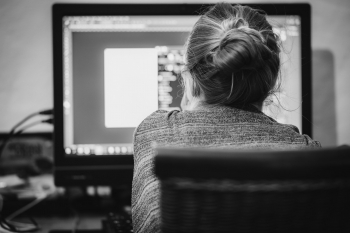Mental health when working from home
(Posted on 10/02/21)

If you’re usually based in an office for your job, then it’s likely that you’re currently working from home. The post-New Year lockdown in the UK has resulted in anyone who can reasonably do their job from the confines of their own home to do so.
It was already apparent that the rules laid out by the government and its advisors were going to make offices re-opening after the Christmas break difficult. The complicated logistics of offices, particularly if you work for a large organisation, are causing nightmares for bosses. The simple operation of getting everyone on site, keeping the area clean, or maintaining socially-distanced spaces between desks, is simply not achievable for many firms. So, work from home, or WFH, it is for the foreseeable future.
Define work
The blurred lines between working from home and living at home can be difficult to separate. If you work for yourself, or run a small business, you can find yourself working to suit yourself and your family. But that can mean that you end up working longer hours, or weekends and evenings, without actually realising it. This is even more likely to happen if you enjoy your job and find logging on to get updates and check emails becoming second nature. It is difficult too if your workspace is also the kitchen table.
If you’re being strict like Dolly Parton and only working 9-to-5, then it’s easy to have a stop point in the day. But if you’re trying to get something finished, or a client or manager rings you ‘out of hours’, then it’s difficult not to respond and you might quickly find yourself working again once more.
Define home
When your working day ends, you should be able to feel as though you’re not obliged to be constantly on call. Many people had already adopted a WFH-style model long before Covid-19 impacted. WFH offers a wide variety of benefits, from increased flexibility and time management to shorter commutes and better kitchen facilities.
At the end of the day, you must be able to switch off, both physically and mentally, from work. Have a reset. Before lockdown this may have been going for a walk, meeting friends for a coffee or meal, doing a sport or going to the gym. All these opportunities, with the exception of walking, are currently not an option. You need to find the ‘reset’ that works for you. It might be watching a TV series, listening to music, reading a book, or just doing something that has nothing to do with your job.
Pets are a good way of relieving stress and helping relaxation. But you also need mental stimulus – doing a quiz, playing a game. Using your brain but also enjoying, communicating, perhaps even laughing. All these things are good for our mental health.
Unplug, unwind
Damage to mental health is one of the biggest collateral effects of the current pandemic. People aren’t socialising in the way they normally would do. Some people enjoy the social interaction work gives them, as not everyone has a wider support network of family and friends. Work for some is their biggest form of social interaction. Take that away and you have an increasingly isolated population, sometimes lonely, often feeling cut off. It’s important that employers in particular don’t forget about their remote workers, as it’s much more difficult to gauge and monitor someone’s mental wellbeing via emails and Zoom.
‘Hobby’ is an old-fashioned word, but in the present climate, having one can be immensely fulfilling and a great way to unwind. The popularity of online forums and being able to buy materials on the internet has seen an upsurge in painting, crafting, collecting and all kinds of making, baking and creating. Unless it’s already your job, it is a complete break from work and engages your mind in an entirely different way. Whatever your reset might be, find the one that works for you and enjoy it.
Your mental health is as important as your physical health when it comes to living and working in these uncertain times.







